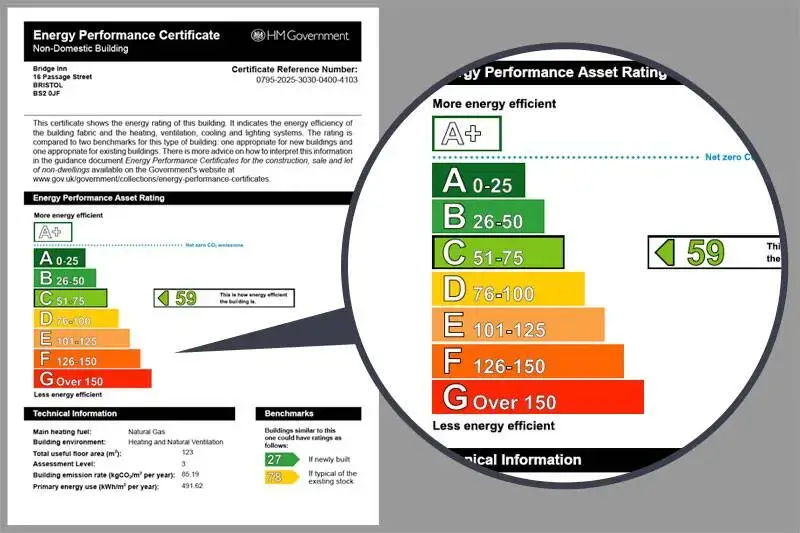What Is a Commercial EPC?
A Commercial EPC (also known as a Non-Domestic EPC) rates the energy performance of commercial buildings on a scale from A+ (most efficient) to G (least efficient). The certificate is based on a standardised assessment of the building’s fabric, heating, ventilation, lighting, and cooling systems. It includes an energy efficiency score and a list of recommendations to improve performance.
Unlike domestic EPCs, which focus on estimated running costs, commercial EPCs assess carbon dioxide emissions. The rating reflects the energy efficiency of the property itself, not how occupants use it. The EPC must be produced by a qualified Non-Domestic Energy Assessor and is valid for 10 years.

When Is a Commercial EPC Required?
You need a valid Commercial EPC if you:
- Sell or lease a commercial property
- Construct a new commercial building
- Make modifications to an existing building that affect its energy performance
The certificate must be provided to prospective buyers or tenants before marketing begins. It is also required for compliance with Building Regulations at completion for new builds.
How Are Commercial EPCs Calculated?
Commercial EPCs are calculated using government-approved software. Most assessments use the Simplified Building Energy Model (SBEM), which evaluates energy use and carbon emissions based on the building’s structure and fixed services.
The assessor collects data on insulation, HVAC systems, lighting, glazing, floor area, and the building’s use. For complex buildings, Dynamic Simulation Modelling (DSM) may be used instead. The software then calculates an asset rating, which is converted into the EPC score and band.
New builds require a design-stage SBEM calculation and an as-built assessment to produce the final EPC.
Who Can Produce a Commercial EPC?
Only accredited Non-Domestic Energy Assessors (NDEAs) can carry out Commercial EPC assessments. Assessors are qualified at Levels 3, 4, or 5, depending on the complexity of the building:
- Level 3: Simple existing buildings (e.g. small offices, retail units)
- Level 4: New builds or more complex buildings (e.g. larger systems, advanced HVAC)
- Level 5: Very complex buildings requiring DSM
Choosing the right level assessor ensures compliance and accuracy.
MEES: Minimum Energy Efficiency Standards
Since April 2018, landlords in England and Wales must achieve a minimum EPC rating of E before granting a new lease. As of April 2023, this rule applies to all existing commercial leases.
Failure to comply with MEES can result in fines of up to £150,000. Properties rated F or G may not be legally let unless:
- Improvements are made to meet the standard
- A valid exemption is registered (e.g. cost, consent, or structural restrictions)
The government aims to tighten MEES regulations further, potentially requiring a minimum C rating by 2027 and B rating by 2030.
Are Any Commercial Buildings Exempt?
Some buildings may not require an EPC. These include:
- Places of worship
- Temporary buildings (used for less than 2 years)
- Stand-alone buildings under 50m²
- Industrial and agricultural buildings with low energy demand
- Properties due for demolition
- Listed buildings where improvements would alter their character
Review our breakdown of EPC exemptions to determine if your property qualifies.
Summary
Commercial EPCs are essential for legal compliance and understanding your property’s energy performance. Whether you’re leasing, selling, or building, having a valid EPC is mandatory in most cases. With MEES regulations now in force and tightening in the near future, ensuring your property meets minimum standards is more important than ever.
Need an EPC? Our network of qualified, independent energy assessors handle both domestic and commercial EPCs. Visit the Areas We Cover page to find your local assessor.
